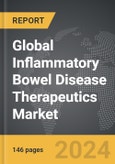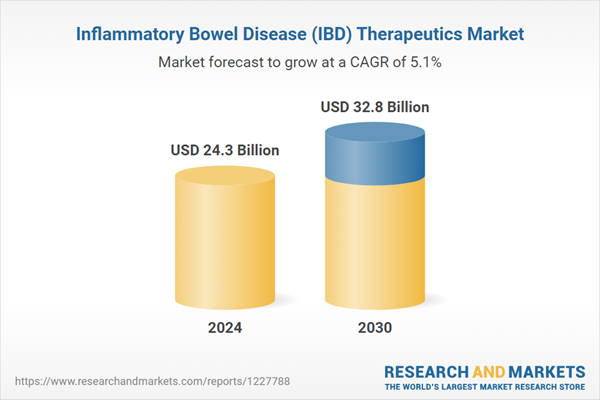Inflammatory Bowel Disease (IBD) Therapeutics - Key Trends and Drivers
Inflammatory Bowel Disease (IBD) therapeutics encompasses a range of treatments designed to manage and alleviate the symptoms of chronic inflammatory conditions of the gastrointestinal tract, primarily Crohn's disease and ulcerative colitis. These conditions cause severe inflammation, leading to symptoms such as abdominal pain, diarrhea, rectal bleeding, and weight loss. The primary goal of IBD therapeutics is to induce and maintain remission, reduce inflammation, and improve patients' quality of life. Treatment options include aminosalicylates, corticosteroids, immunomodulators, biologics, and, more recently, small molecule drugs. Biologics, which target specific components of the immune system, have revolutionized IBD treatment, providing relief for patients who do not respond to traditional therapies. However, the complexity of IBD, with its varying presentations and patient responses, necessitates a personalized approach to treatment.Technological advancements and ongoing research are significantly impacting the IBD therapeutics landscape. The development of novel biologic therapies and biosimilars has expanded the range of treatment options available to patients. These therapies, including TNF inhibitors, integrin inhibitors, and interleukin inhibitors, offer targeted mechanisms of action that help control inflammation more effectively and with fewer side effects than conventional treatments. Additionally, advancements in precision medicine and pharmacogenomics are enabling more personalized treatment strategies, optimizing therapeutic outcomes based on individual patient profiles. Non-invasive diagnostic tools, such as advanced imaging techniques and biomarkers, are improving the ability to monitor disease activity and treatment response, allowing for more timely and accurate adjustments to therapeutic regimens. Furthermore, digital health technologies, including mobile health apps and telemedicine, are enhancing patient management and adherence to treatment plans by facilitating better communication between patients and healthcare providers.
The growth in the IBD therapeutics market is driven by several factors, including the increasing prevalence of IBD, technological innovations, and greater awareness and diagnosis of the condition. The rising incidence of IBD globally, particularly in developed regions, is significantly expanding the patient population in need of effective treatments. Technological advancements in biologic therapies and the development of biosimilars are reducing treatment costs and making advanced therapies more accessible. The integration of precision medicine into IBD treatment protocols is leading to more effective and personalized therapeutic approaches, improving patient outcomes and satisfaction. Additionally, the adoption of digital health technologies is facilitating better disease management and patient engagement, driving adherence to treatment plans. Regulatory support for novel therapies and expedited approval processes for new drugs are also contributing to market growth. Moreover, ongoing clinical trials and research into the pathophysiology of IBD are paving the way for the development of next-generation therapeutics, promising even more effective and targeted treatment options in the future. These combined factors underscore the dynamic and rapidly evolving nature of the IBD therapeutics market.
Report Scope
The report analyzes the Inflammatory Bowel Disease (IBD) Therapeutics market, presented in terms of market value. The analysis covers the key segments and geographic regions outlined below.- Segments: Drug Class (TNF inhibitors, Anti-integrin, Corticosteroids, Aminosalicylates, IL inhibitors, JAK inhibitors, Other Drug Classes); Type (Crohn's Disease, Ulcerative Colitis); Route of Administration (Injectable, Oral); Distribution Channel (Hospital Pharmacy, Retail Pharmacy, Online Pharmacy).
- Geographic Regions/Countries: World; United States; Canada; Japan; China; Europe (France; Germany; Italy; United Kingdom; Spain; Russia; and Rest of Europe); Asia-Pacific (Australia; India; South Korea; and Rest of Asia-Pacific); Latin America (Argentina; Brazil; Mexico; and Rest of Latin America); Middle East (Iran; Israel; Saudi Arabia; United Arab Emirates; and Rest of Middle East); and Africa.
Key Insights:
- Market Growth: Understand the significant growth trajectory of the TNF inhibitors segment, which is expected to reach US$14.0 Billion by 2030 with a CAGR of a 5.9%. The Anti-integrin segment is also set to grow at 4.9% CAGR over the analysis period.
- Regional Analysis: Gain insights into the U.S. market, valued at $6.3 Billion in 2024, and China, forecasted to grow at an impressive 8.2% CAGR to reach $7.6 Billion by 2030. Discover growth trends in other key regions, including Japan, Canada, Germany, and the Asia-Pacific.
Why You Should Buy This Report:
- Detailed Market Analysis: Access a thorough analysis of the Global Inflammatory Bowel Disease (IBD) Therapeutics Market, covering all major geographic regions and market segments.
- Competitive Insights: Get an overview of the competitive landscape, including the market presence of major players across different geographies.
- Future Trends and Drivers: Understand the key trends and drivers shaping the future of the Global Inflammatory Bowel Disease (IBD) Therapeutics Market.
- Actionable Insights: Benefit from actionable insights that can help you identify new revenue opportunities and make strategic business decisions.
Key Questions Answered:
- How is the Global Inflammatory Bowel Disease (IBD) Therapeutics Market expected to evolve by 2030?
- What are the main drivers and restraints affecting the market?
- Which market segments will grow the most over the forecast period?
- How will market shares for different regions and segments change by 2030?
- Who are the leading players in the market, and what are their prospects?
Report Features:
- Comprehensive Market Data: Independent analysis of annual sales and market forecasts in US$ Million from 2024 to 2030.
- In-Depth Regional Analysis: Detailed insights into key markets, including the U.S., China, Japan, Canada, Europe, Asia-Pacific, Latin America, Middle East, and Africa.
- Company Profiles: Coverage of players such as Alnylam Pharmaceuticals, Inc., Evotec AG, GlaxoSmithKline PLC, Horizon Therapeutics plc, Ionis Pharmaceuticals, Inc. and more.
- Complimentary Updates: Receive free report updates for one year to keep you informed of the latest market developments.
Some of the 69 companies featured in this Inflammatory Bowel Disease (IBD) Therapeutics market report include:
- Aclaris Therapeutics
- Amgen, Inc.
- Cosmo Pharmaceuticals
- Dr. Falk Pharma GmbH
- Evotec SE
- F. Hoffmann-La Roche AG
- Formycon
- Gilead Sciences, Inc.
- InDex Pharmaceuticals Holding AB
- Kobiolabs
This edition integrates the latest global trade and economic shifts into comprehensive market analysis. Key updates include:
- Tariff and Trade Impact: Insights into global tariff negotiations across 180+ countries, with analysis of supply chain turbulence, sourcing disruptions, and geographic realignment. Special focus on 2025 as a pivotal year for trade tensions, including updated perspectives on the Trump-era tariffs.
- Adjusted Forecasts and Analytics: Revised global and regional market forecasts through 2030, incorporating tariff effects, economic uncertainty, and structural changes in globalization. Includes historical analysis from 2015 to 2023.
- Strategic Market Dynamics: Evaluation of revised market prospects, regional outlooks, and key economic indicators such as population and urbanization trends.
- Innovation & Technology Trends: Latest developments in product and process innovation, emerging technologies, and key industry drivers shaping the competitive landscape.
- Competitive Intelligence: Updated global market share estimates for 2025, competitive positioning of major players (Strong/Active/Niche/Trivial), and refined focus on leading global brands and core players.
- Expert Insight & Commentary: Strategic analysis from economists, trade experts, and domain specialists to contextualize market shifts and identify emerging opportunities.
Table of Contents
Companies Mentioned (Partial List)
A selection of companies mentioned in this report includes, but is not limited to:
- Aclaris Therapeutics
- Amgen, Inc.
- Cosmo Pharmaceuticals
- Dr. Falk Pharma GmbH
- Evotec SE
- F. Hoffmann-La Roche AG
- Formycon
- Gilead Sciences, Inc.
- InDex Pharmaceuticals Holding AB
- Kobiolabs
Table Information
| Report Attribute | Details |
|---|---|
| No. of Pages | 504 |
| Published | January 2026 |
| Forecast Period | 2024 - 2030 |
| Estimated Market Value ( USD | $ 24.3 Billion |
| Forecasted Market Value ( USD | $ 32.8 Billion |
| Compound Annual Growth Rate | 5.1% |
| Regions Covered | Global |









